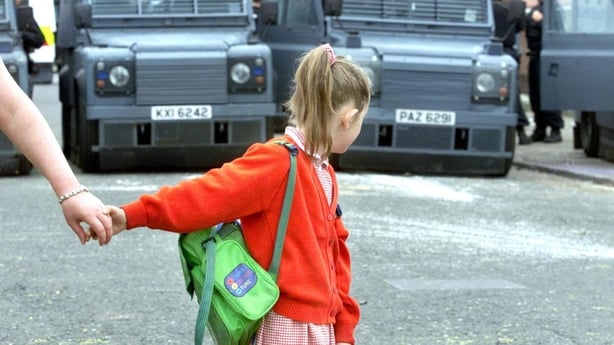By David McCullagh and Fiachra Ó Cionnaith
The Irish government offered emergency accommodation to a Catholic priest who received death threats in 2003 after a loyalist protest outside a primary school in north Belfast.
Fr Aiden Troy, who was targeted because of his prominent role in the dispute over Holy Cross primary school, declined the offer, because he wanted to stay close to his congregation.
The dispute began in June 2001, with protests by loyalists against nationalist children walking to school through "their" area.
Images of traumatised schoolgirls protected by riot police from a gauntlet of protesters went around the world.

The dispute was a public relations disaster for loyalists – after a pipe bomb attack on police early in 2002, Billy Hutchinson of the loyalist Progressive Unionist Party wanted to walk away from the dispute, but was persuaded to stay involved by the UVF, who were anxious to see it resolved.
Hutchinson later paid tribute to the IRA for exercising "a calming and responsible influence" and said Sinn Féin's Gerry Kelly had kept the "nutcases" on the nationalist side in check.
Fr Troy, the chairman of the school’s Board of Governors, became a prominent figure during the protests and paid a price for coming to the attention of loyalist paramilitaries, being regularly threatened.
Even after the protest ended in 2002, the intimidation continued.
Read more:
1994 State Papers shed little light on FF-Labour collapse
Racketeering was 'a fact of life' for paramilitaries
Bruton sceptical SF, SDLP represented nationalist views
Issues with Rome embassy pool described as a 'debacle'
Five other things we learned from the State Papers
A pipe bomb was left outside the school on 6 January 2003, and later that month Fr Troy received two death threats from loyalists, one was phoned into the BBC, the other into the Samaritans.
Police told him they had intelligence of a threat to kill him within two days and advised him to take special precautions and avoid Ardoyne.
Fr Troy told Belfast-based Irish diplomats that he didn’t want to leave Ardoyne, nor did he want to draw attention to the threats because of the effect it might have on the children.
The officials offered him the use of one of the apartments the Department of Foreign Affairs had leased in Belfast, this would allow him temporarily to move out of Ardoyne while still staying in touch with his congregation.
Fr Troy opted to stay in Ardoyne, despite the dangers, the Irish officials made sure their British counterparts were aware of the threats, and that police would respond immediately to any request for help.
[Based on documents in 2024/71/377 and 2024/130/6]

